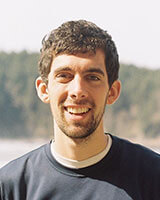 I grew up in a family that emphasized the importance of education, but placed even more focus on the importance of community. When considering UScholars, I saw the opportunity for intense scholarship coupled with deep friendships, and this seemed to be an experience worth pursuing.
I grew up in a family that emphasized the importance of education, but placed even more focus on the importance of community. When considering UScholars, I saw the opportunity for intense scholarship coupled with deep friendships, and this seemed to be an experience worth pursuing.
I was drawn to SPU because of its focus on professor-student relationships, and UScholars seemed to offer this in a more focused way.
My first class in the program was the UScholars Seminar with Dr. Kevin Neuhouser. As we explored a variety of cross-cultural encounters, Dr. Neuhouser’s kindness, gentle strength, and challenging questions helped me feel at home. We learned about his time in Brazil, experiences that have shaped his teaching in profound ways. Less than two years later, I found myself sitting next to him on a plane to Recife, Brazil, traveling with four other students as part of SPRINT (Seattle Pacific Reachout International). What began as stories heard in the classroom became an incredible six weeks of learning about community development in Brazil, with Dr. Neuhouser as teacher, cultural bridge, translator, and friend.
The University Scholars program has provided models — through professors, peers, texts, and experiences — of how Christian faith and scholarship can be integrated in creative and compelling ways.
As a part of the class Faith and Science I, we read Michael Polanyi’s book
Personal Knowledge. Polanyi was a philosopher and chemist who set out in this book to show the importance of our own participation in our knowledge. This book is one of the densest and most difficult I have read, yet it allowed me to conceptualize how a mind of faith and mind of reason can coexist and be one in the same. Reading Polanyi’s book and studying it in community has given me permission to be a Christian who engages deeply with reason, logic, and science.
My honors project analyzed the idea of reforming the UN Security Council through the lenses of path dependency theory, which considers how past decisions limit present and future options for change. Scholarship of that type is more challenging than I expected, but also much more rewarding than I had imagined.
Many of my closest friendships grew out of the UScholars program. We often met up the night before a big paper was due for “paper parties”— where we passed around our laptops, providing notes and corrections for each others’ work. Regardless of how early or late the work started and finished, we always seemed to laugh much more than a paper on Virgil seemed to warrant. These friendships transformed into vital relationships as we navigated life together.
I spent my first year after graduation working in youth and discipleship ministries in Seattle and the Santa Cruz Mountains. Now I'm beginning the Master of Divinity program at Duke Divinity School, where I will study for at least three years. After finishing my degree, I hope to work in teaching and discipleship ministry somewhere with the forest and mountains close at hand.